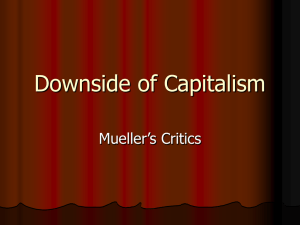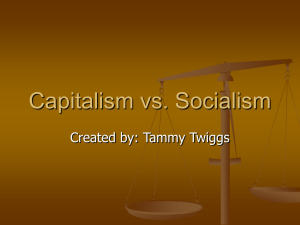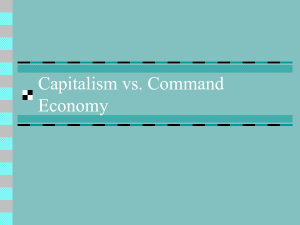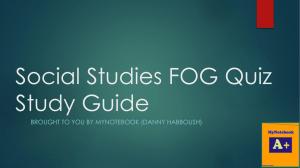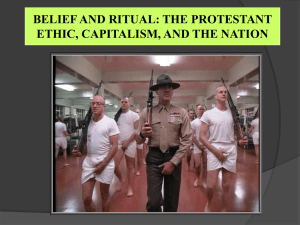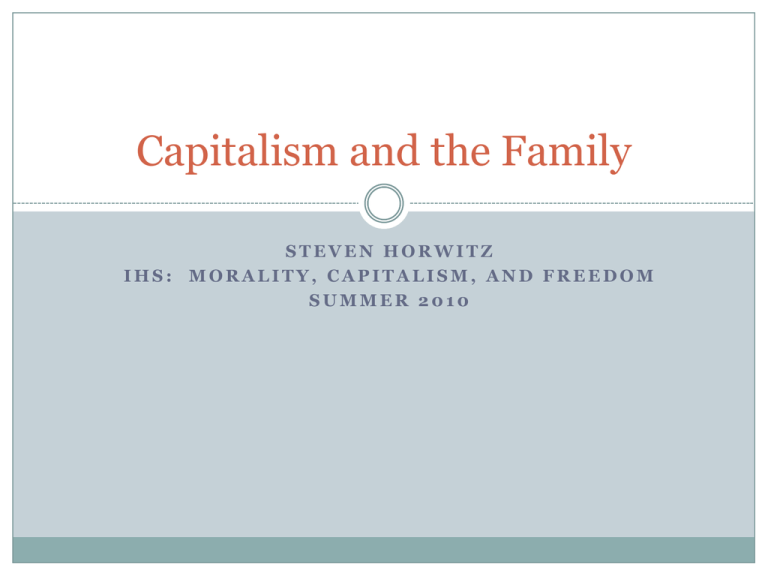
Capitalism and the Family
STEVEN HORWITZ
IHS: MORALITY, CAPITALISM, AND FREEDOM
SUMMER 2010
Opening Thoughts
A history of the evolution of the family in which
capitalism is the source of desirable changes in the
direction of more freedom
Left: family freedom good, but capitalism not
Right: capitalism good, but family freedom not
Why not celebrate both?
Two opening claims:
No such thing as the “traditional family”
The multiple meanings of “normal family”
Function and form
The Modern and Pre-Modern Family
The modern family
Marital choice by consent and emotional/romantic attraction
The family as a private, insulated space
Children treated sentimentally and uniquely valued
Legal equality and more economic equality between genders
The pre-industrial family
Family as the unit of production not consumption
The household is the firm
Family is also a political unit
Why was this “pre-modern?”
Arranged marriages – and even where it was
consent, it was not about love
“Yoke mates rather than soul mates”
Production complementarities not consumption ones
Women were effectively chattel
Children were economic assets
Large family size, high infant mortality rates
Family was porous to the public and not private
Church, state, and community involved in marriage, adoption,
and sexuality
No divorce
Capitalism creates the modern family
So what changed the pre-modern family?
Capitalism:
Industrialization and the advent of wage labor
Higher incomes due to economic growth
Separation of market and household production
Higher wages mean child labor eventually disappears
Children go from directly producing assets to investments
This means they become expensive
Childhood becomes the “sheltered childhood” we now know
Family size begins to shrink even as infant mortality drops
Changes in marriage
With families having more wealth:
The state, the community, the church and even parents are
pushed back
Marriage is a matter of choice and affection not economics
Consumption complementarities matter more than production
We get the “nuclear family” we now know
The “separate spheres” of the Victorian Era
By early 20th century, women begin to enter labor
force in clerical/service jobs
Higher incomes mean more education for boys AND girls
We more or less now have the modern family
The 20th century
Key event: the steady increase in women’s labor
force participation rates
Myth: the 60s “caused” married women to start working
If anything, women working caused the women’s movement!
The Pill is more important
Since the 60s: rise of working moms with very young kids
What led to more women working?
Higher wages that drew them out from the home
a consequence of more education that raised their human capital
and higher demand for labor resulting from economic growth that
raised the value of that human capital
Women, Market Work, and the Family
Changes in household production:
Technological advances reduces time necessary
Economic growth provides market substitutes for time
Impact on the family
Women are freer to create and leave marriages thanks to
greater wealth and reduction in specialization by gender
Fewer kids and more wealth means child care is less time
consuming and more easily purchased on the market
Family moves from an economic to psychological/emotional
one
Children become increasingly “precious”
Some thoughts on divorce
One effect of capitalism on the family is higher
divorce rates
Preferences have changed: the bar for being happy, especially
for women, is much higher. More easily disappointed.
Constraints have changed: unhappy people, particularly
women, can now leave in ways they couldn’t before
Costs and benefits of divorce
This is clearly a win for women, although no-fault has issues
Divorce is not good for kids, but…
Evidence is clear that a cooperative divorce is better than a
tension-filled marriage
Finally: even if divorce hurts kids, adults matter too
Capitalism and Same-Sex Marriage
Capitalism created gay and lesbian identity
Wage labor eliminated the economic need for a family
Capitalism produced anonymous urban centers
Why same-sex marriage now?
Classical liberalism’s tolerance for “anything that’s peaceful”
Wealth and technology separated sex, marriage, and
reproduction for heterosexuals
Capitalism transformed marriage from being economic and
reproductive to being based on emotion and affection
Add it all up, and this seems like the logical next step
Function, form, and family freedom
It’s evolution not revolution
Marriage, Family, and the State
Some questions to ponder:
Should the state have a role in marriage at all?
If the state does have a role, is there a libertarian case for
legalizing same-sex marriages?
If so, where would you find the constitutional argument?
How might libertarians deal with the tricky question of
children’s rights? Is the issue better thought of in terms of
“parental rights?”
Anyone know the constitutional law here?
Final thought on capitalism, family, and
instrumental rationality.


